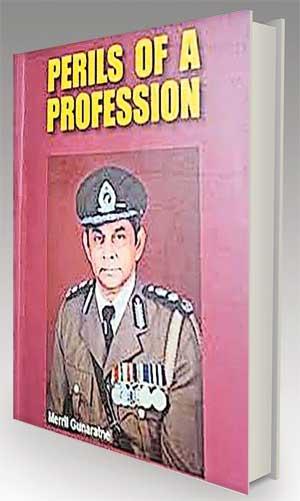25 Jan 2021 - {{hitsCtrl.values.hits}}
There is great concern in the country regarding the ever-changing nature of our Constitution and the implications  for all of us. As important as the Constitution, are the public institutions that have a great bearing on the day-to-day life of the country and its people.
for all of us. As important as the Constitution, are the public institutions that have a great bearing on the day-to-day life of the country and its people.
Appropriate and efficient institutions - the Sri Lanka Administrative Service (SLAS), the health service, engineering services, local government mechanisms, the Police - are vital to the efficient conduct of public life.
It is a matter for great regret that we have neglected these institutions and diminished their authority and the autonomous spaces they had, for the sake of greater political and party control. The politicization of the Police is no exception. The volume under review is a fine illustration of the story decline of one these great institutions - the Police after 1977.
 The author of this volume, Merril Gunaratne, a former Senior Deputy Inspector General of Police, was a fine officer in his time, carrying out his duties impartially and in the public interest.
The author of this volume, Merril Gunaratne, a former Senior Deputy Inspector General of Police, was a fine officer in his time, carrying out his duties impartially and in the public interest.
He is a product of the University of Peradeniya in the early 1960s, having read history for his degree. He was a top cricketer and played for the university when it was captained by the formidable D.H. De Silva. Later, he was a leading member of the Police cricket team.
He retired from the Police as a Senior DIG although it is generally believed that politics deprived him of obtaining the top spot as IGP, which he richly deserved.
The volume is largely a memoir of his time in the Police force in the 1960s, 70s and 80s where he served as ASP, SP,
and DIG.
A leading theme is the politicization of the Sri Lankan police, especially after 1977 and with a new Constitution which removed most of the autonomy that institutions like the Police had. Another theme is the structure of the Police Force - recruitment, training, placements, promotions, the principle of seniority, the lack of leadership in the face of political pressure and so on.
"It is a matter for great regret that we have neglected these institutions and diminished their authority and the autonomous spaces they had, for the sake of greater political and party control. The politicization of the Police is no exception. The volume under review is a fine illustration of the story of the decline of one of these great institutions - the Police after 1977."
The author has the highest regard for former IGP Cyril Herath who took premature retirement, refusing to bow to political pressure. He refused an ambassadorial position offered as compensation.
The volume contains much information on various instances of Police intervention, which were much talked of at the time – confrontation with the Minister, Cyril Mathew at the Kelaniya University, the hostage drama in Biyagama, the Muslim-Sinhala riots in Aluthgama in 1991 and many others, where the author was directly involved.
An interesting feature of the book is an Introduction and a Foreword by Dr Rohan Gunaratne and Dhammike Amarasinghe, respectively. They offer us valuable insights into the many issues raised in the volume.
The politicization of the Police Force is clearly evident since 1977. Politicians at Ministerial level and above, and even at Provincial and District levels, have intervened with Police transfers and promotions. When this happens, and the top brass of the Police do not resist these trends, the impression gained by the ordinary Police officer is that it is in his interest to cultivate the politicians, who can assist them in their transfers and promotions.
Merril Gunaratne’s volume clearly points to the lack of leadership in the Police Force about political intervention. The story of the confrontation between Minister Cyril Mathew and the author at Kelaniya is a rare instance in recent times of the Police standing up to a leading politician. The Minister asked the author to remove his Police Force from the Kelaniya University so that his gang of thugs and other supporters that he had brought could have a free run in attacking the Kelaniya University students. When that demand was rejected, the Minister and his gang disappeared. This type of action would not have endeared the author to the then political establishment.
With regard to the training of policemen recruited at the level of ASP, the author suggests that they should undergo a kind of training, being attached to a Police Station, to understand the realities of day-to-day policing and managing a Police Station. He feels that the directly recruited ASPs lack that intimate knowledge of day-to-day policing and Police stations that are essential for the efficient conduct of duties at the higher levels. While this is appropriate, it needs to be understood that graduates coming into the Police force have a vital role in injecting a broad-minded, thinking, and even a kind of intellectual approach to policing. Day-to-day policing has obvious implications for democratic values and the liberty of citizens and university education is appropriate for future Police leaders.
Issues of seniority and promotion are addressed in this volume. These questions arise not only in the Police but also in other government services. However, in the Police, they are much more vital to the integrity and the morale of the Police Force.
The author points to many instances where seniority was ignored to make high-level appointments, and that has led to demoralization and even increasing politicization. There are many instances in which the author points out those senior-level promotions were made, disregarding the principle of seniority to appoint political favourites.
While agreeing with the author’s contention of seniority being the main factor for promotions, there should also be objective and independent mechanisms, to deny promotions to those considered ineffective.
While the picture before 1977 was rosier than the period after, the pre-1977 policing was not without significant problems. The inheritance from the colonial days was for a Police Force, detached from the common man. People like Dowbiggin who was IGP for a long time in the 1920s and 1930s were virtually a law unto themselves and had strong ideas about British imperial rule. That type of policing by people like Dowbiggin had a more than passing influence on local policemen of that time.
Cruelty was endemic in many Police stations, and Police leaders took no action. Then more lately, there was the 1962 attempted coup, where some of the Police top brass were involved, trying to oust a legitimate government. Some top policemen at that time were certainly politically inclined.
So, what has happened since 1977 is not entirely new, although the pace of Police politicization has increased.
Merril Gunaratne’s insightful volume comes at an ideal time when the Police need a comprehensive review of its role in the nation’s affairs. The author has suggested that a Presidential Commission should undertake this task.
That is certainly an approach to be commended. Another important aspect that has been neglected in Sri Lanka is a research institution independent of the Police which can undertake continuing research on the role of policing in the country, similar to economic research institutions. Research is a vital part of improving improve any policy or institution, and any Presidential Commission should have access to a comprehensive body of relevant research.
This brief volume offers the reader a range of insights into Police practices. It is well written and highly readable.
Gunaratne, Merril-Perils of a Profession. Published January 2021.
Pp 136. LKR 300.
Available at Vijitha Yapa and Sarasavi Bookshops.
27 Nov 2024 55 minute ago
27 Nov 2024 2 hours ago
27 Nov 2024 2 hours ago
27 Nov 2024 2 hours ago
27 Nov 2024 3 hours ago